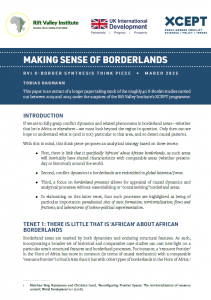This think piece is an extract of a longer paper taking stock of the roughly 40 X-Border studies carried out between 2019 and 2025 under the auspices of the Rift Valley Institute’s XCEPT programme.
If we are to fully grasp conflict dynamics and related phenomena in borderland areas—whether that be in Africa or elsewhere—we must look beyond the region in question. Only then can we hope to understand what is (and is not) particular to that area, and so detect causal patterns.
With this in mind, this think piece proposes an analytical strategy based on three tenets:
- First, there is little that is specifically ‘African’ about African borderlands, as such areas will inevitably have shared characteristics with comparable areas (whether present-day or historical) around the world.
- Second, conflict dynamics in borderlands are embedded in global historical forces.
- Third, a focus on borderland processes allows for appraisal of causal dynamics and analytical processes without essentializing or ‘containerizing’ borderland areas.
- In elaborating on this latter tenet, four such processes are highlighted as being of particular importance: paradoxical sites of state formation; territorialization; flows and frictions; and laboratories of techno-political experimentation.
XCEPT PROGRAMME
This think piece is a product of RVI’s Cross-Border Conflict Evidence, Policy and Trends (XCEPT) research programme. XCEPT brings together leading local and international experts to examine conflict-affected borderlands, how conflicts connect across borders, and the factors that shape violent and peaceful behaviour. The programme carries out research to better understand the causes and impacts of conflict in border areas and their international dimensions. Funded by UK International Development, XCEPT offers actionable research to inform policies and programmes that support peace, and builds the skills of local partners. The views expressed do not necessarily reflect the UK government’s official policies.




